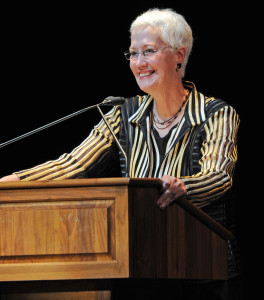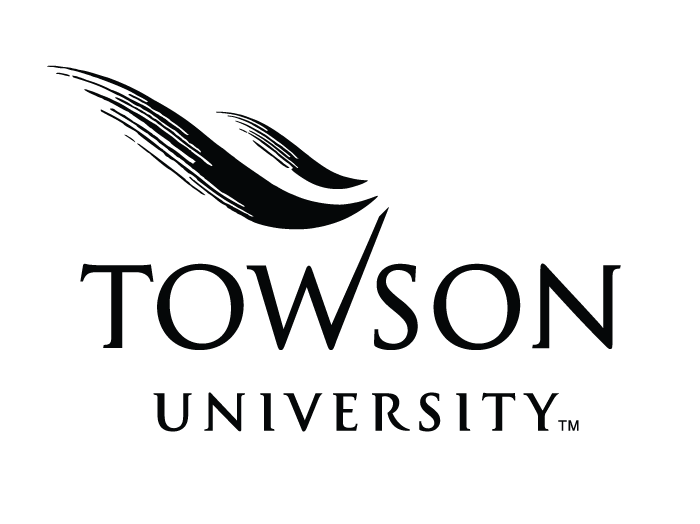President Maravene Loeschke’s fall address in Stephens Hall began with a soul-stirring performance: voices strong and clear, hands mimicking heartbeats on chests. “It takes a village to raise our children/It takes a whole village to raise one child…”
It was a fitting open to the focus of the president’s message: faculty and their significant contributions to the success of every student they teach at Towson University.
Loeschke moved quickly from her warm opening to the meat of her message. She outlined significant achievements university-wide, including Towson’s selection as one of only a handful of institutions in the country to receive the James Patterson Teacher Education Scholarship, a $6,000 per year award for eight students intending to become educators named for its donor, the bestselling mystery writer.

The focus of the president’s message? Faculty and their significant contributions to the success of every student they teach at Towson University.
Describing the day she learned of Patterson’s offer, Loeschke said, “He called my office and asked if he could talk to me.” She added a wry smile, conveying that she would obviously have taken the call.
Loeschke summarized the financial support expected from the state this year—about $13 million, the first significant increase in state funding in five years. Included in that funding is $1.7 million for STEM, health care and campus enhancement; $1.6 million for faculty positions and promotion; $5 million for cost of living and merit-based pay; and $1.5 million to increase scholarship funding.
The president highlighted the institution’s pride in establishing its own UTeach program, an initiative aimed at training majors in STEM fields to teach at the high school level so that high school graduates can be better prepared. “We are the only such program in the state, and Towson’s UTeach success is bringing us statewide and even national attention,” Loeschke said.
Funding student education is the first of the concerns the president listed. With the average U.S. college student graduating with $20,000 in debt, the university’s first responsibility should be to ensure that scheduling, course offerings and faculty time preferences do not stand in the way of a student’s ability to graduate as quickly as he or she desires, to reduce cost. She also suggested an innovative method of letting some 12th grade students use their final year of high school as credit toward a freshman year of college.
But while they’re here, Loeschke said, they will be able to use the Student Affairs division’s new Student Engagement Record, a co-curricular transcript that can document every experience and involvement a student has in an official group, internship or program. At any time, the student can access and print a PDF version of that record, to serve as part of their curriculum vitae.
The president shared that the state and federal government will hold its educational institutions accountable for how well they serve low-income students and how many of their students graduate. “There is no question that federal aid will be allocated differently,” she said. “The question for us at Towson and all of us in the system is, ‘What is the appropriate balance between need-based and merit-based financial aid?'”
The president also raised her concern about civility. Loeschke noted that graduating students of character is increasingly challenging in a digital world open to opinions and negative messages.
“We cannot change the world,” she said, “but we can send at least 5,000 students a year into the world who know the power of human respect.”
About 30 minutes into her address, Loeschke felt faint and was assisted off the stage by her staff. Medical personnel responded and determined that she did not require hospital treatment. The president issued this statement to the campus community the following morning:
I deeply appreciate the outpouring of support and concern for my well-being following my sudden exit at the end of the Fall Address yesterday. After 45 minutes of standing and speaking, I was overwhelmed by the heat of the stage lights and felt faint. I have been assured by my physician that I am fine and I plan to be back at work on Monday. I want to thank Deputy Chief of Staff, Marina Cooper, for the great job she did finishing the recognition of our outstanding faculty, which was so very important to me. I am thankful for you all.
